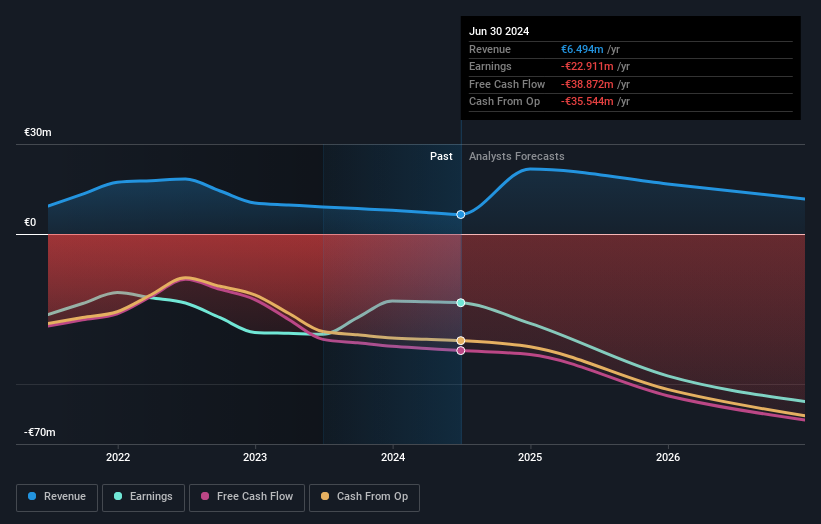Insiders were the biggest winners as Transgene SA's (EPA:TNG) market cap grew by €11m last week
Key Insights
- Transgene's significant insider ownership suggests inherent interests in company's expansion
- The largest shareholder of the company is Alain Merieux with a 69% stake
- Ownership research, combined with past performance data can help provide a good understanding of opportunities in a stock
A look at the shareholders of Transgene SA (EPA:TNG) can tell us which group is most powerful. We can see that individual insiders own the lion's share in the company with 70% ownership. Put another way, the group faces the maximum upside potential (or downside risk).
As a result, insiders were the biggest beneficiaries of last week’s 12% gain.
Let's take a closer look to see what the different types of shareholders can tell us about Transgene.
Check out our latest analysis for Transgene

What Does The Institutional Ownership Tell Us About Transgene?
Institutions typically measure themselves against a benchmark when reporting to their own investors, so they often become more enthusiastic about a stock once it's included in a major index. We would expect most companies to have some institutions on the register, especially if they are growing.
Institutions have a very small stake in Transgene. That indicates that the company is on the radar of some funds, but it isn't particularly popular with professional investors at the moment. If the company is growing earnings, that may indicate that it is just beginning to catch the attention of these deep-pocketed investors. When multiple institutional investors want to buy shares, we often see a rising share price. The past revenue trajectory (shown below) can be an indication of future growth, but there are no guarantees.

Hedge funds don't have many shares in Transgene. Our data shows that Alain Merieux is the largest shareholder with 69% of shares outstanding. With such a huge stake in the ownership, we infer that they have significant control of the future of the company. In comparison, the second and third largest shareholders hold about 3.7% and 0.6% of the stock.
Researching institutional ownership is a good way to gauge and filter a stock's expected performance. The same can be achieved by studying analyst sentiments. While there is some analyst coverage, the company is probably not widely covered. So it could gain more attention, down the track.
Insider Ownership Of Transgene
The definition of company insiders can be subjective and does vary between jurisdictions. Our data reflects individual insiders, capturing board members at the very least. Company management run the business, but the CEO will answer to the board, even if he or she is a member of it.
Insider ownership is positive when it signals leadership are thinking like the true owners of the company. However, high insider ownership can also give immense power to a small group within the company. This can be negative in some circumstances.
It seems that insiders own more than half the Transgene SA stock. This gives them a lot of power. So they have a €71m stake in this €101m business. It is good to see this level of investment. You can check here to see if those insiders have been buying recently.
General Public Ownership
The general public-- including retail investors -- own 25% stake in the company, and hence can't easily be ignored. While this group can't necessarily call the shots, it can certainly have a real influence on how the company is run.
Private Company Ownership
We can see that Private Companies own 3.7%, of the shares on issue. It might be worth looking deeper into this. If related parties, such as insiders, have an interest in one of these private companies, that should be disclosed in the annual report. Private companies may also have a strategic interest in the company.
Next Steps:
It's always worth thinking about the different groups who own shares in a company. But to understand Transgene better, we need to consider many other factors. Case in point: We've spotted 6 warning signs for Transgene you should be aware of, and 3 of them can't be ignored.
If you would prefer discover what analysts are predicting in terms of future growth, do not miss this free report on analyst forecasts.
NB: Figures in this article are calculated using data from the last twelve months, which refer to the 12-month period ending on the last date of the month the financial statement is dated. This may not be consistent with full year annual report figures.
Valuation is complex, but we're here to simplify it.
Discover if Transgene might be undervalued or overvalued with our detailed analysis, featuring fair value estimates, potential risks, dividends, insider trades, and its financial condition.
Access Free AnalysisHave feedback on this article? Concerned about the content? Get in touch with us directly. Alternatively, email editorial-team (at) simplywallst.com.
This article by Simply Wall St is general in nature. We provide commentary based on historical data and analyst forecasts only using an unbiased methodology and our articles are not intended to be financial advice. It does not constitute a recommendation to buy or sell any stock, and does not take account of your objectives, or your financial situation. We aim to bring you long-term focused analysis driven by fundamental data. Note that our analysis may not factor in the latest price-sensitive company announcements or qualitative material. Simply Wall St has no position in any stocks mentioned.
About ENXTPA:TNG
Transgene
A biotechnology company, designs and develops therapeutic vaccines and oncolytic viruses for the treatment of cancer in France.
Slight risk with mediocre balance sheet.
Market Insights
Community Narratives



